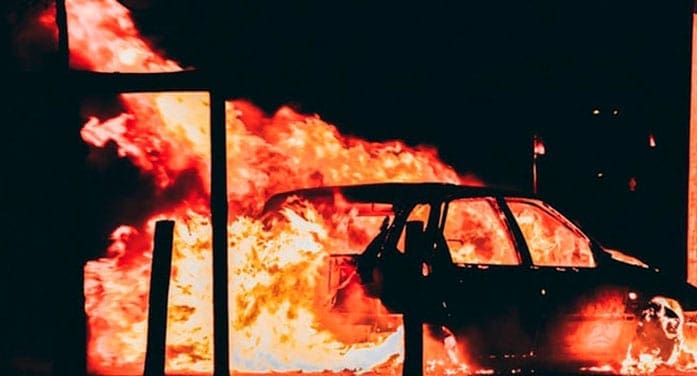By Thomas York
Research Associate
Frontier Centre for Public Policy
In light of the mainstream media coverage of riots and protests in the U.S. in recent months and the questionable claim by some in the media that the riots were “mostly peaceful protests,” the distinction between violent and peaceful protest is worthy of examination.
In the 1960s, Martin Luther King Jr. advocated for non-violent protest, following Mahatma Gandhi’s example. Malcolm X took a more bellicose stance, stating that his political objectives would be met “by any means necessary.” King faced an early version of the Black Lives Matter movement, called the Black Power movement, which he distanced himself from when Black Power activists engaged in riots and looting.
Gandhian tactics are practically useful in a society open to moral arguments, such as Great Britain or the United States, but not against real tyranny. Theologian Reinhold Niebuhr was critical of Gandhi’s idealism and abandoned pacifism, in effect echoing Augustine’s theological justification for “just war.”
Protests that adopt an explicitly non-violent philosophy still exist, but they’re not as influential as more violent protests. The reason for this is that violence is given more attention by the media, as reflected in the adage, “if it bleeds, it leads.” Among the more militant activists, there’s open disdain for non-violent tactics: they often cite Ward Churchill’s book Pacifism as Pathology (2007) and opt for a “diversity of tactics” that permits limited violence (e.g., property destruction, assault).
How is revolutionary violence by anarchists different from police violence?
The short answer is that the police enforce the law, which is necessary for a functioning society. There are anomalous cases of excessive force by police, but they fail to provide a persuasive argument for limiting their powers or defunding them.
Violent anarchists, on the other hand, try to destroy the current society in service to a revolutionary ideal. In 2020, Antifa was used as shock troops in service to what may ultimately become a far more authoritarian system, one similar to that which exists in communist China. If that happens, anarchists may (ironically) be among the first to be purged, as happened in the Spanish Civil War, documented by George Orwell in Homage to Catalonia (1938).
A moral justification for defensive action against real tyranny or the use of force by police to maintain the rule of law doesn’t excuse violent protest in an otherwise peaceful society. It’s preferable to strive to maintain the system of checks and balances that characterize our modern social order.
The use of massive force to implement a Utopian vision is at the root of totalitarianism. Niebuhr concluded that the ideal of perfectibility is illusory and even dangerous. Marxists envisage an ideal society and some are willing to use violence to achieve it.
A limited and lawful force is necessary to safeguard against despotism, but what about the use of extra-judicial force (e.g., militias)?
Utilizing just war doctrine, one could argue that such force may be justified when all lawful means have been exhausted. This idea certainly animates those who defend the Second Amendment of the U.S. Constitution, but use of force outside the law, even in defence of constitutionally guaranteed rights and freedom, carries with it the risk of destabilizing society.
In the 18th century, Immanuel Kant agreed with the principles that animated the French Revolution (e.g., liberty, democracy, egalitarianism), but he disagreed with revolution itself. Use of force in the name of a social or political good can easily go awry. Instead, Kant argued for the use of one’s own reason and incremental (which is to say, lawful) social and political progress.
Leftist progressivists have essentially dispensed with the Enlightenment ideals upon which modern Western societies were founded. Freedom of speech, open and transparent elections, constitutional freedoms and liberties have been historically subverted by collectivist totalizing ideologies.
In the West, there’s a slow erosion of Enlightenment principles and a shift towards collectivist thinking permeating all our institutions. But it hasn’t reached the point that we ought to abandon the rule of law to oppose it. Subverting the rule of law for a political cause is a slippery slope: it has the polarizing effect of amplifying extremism at both ends of the political spectrum.
The concentration of power in hands of an elite technocratic class willing to use censorship is certainly very worrisome. But the free and open use of rational discourse still remains our greatest preventive measure against societal breakdown and the dissolution of human freedoms.
Thomas York is a research associate with the Frontier Centre for Public Policy.
Thomas is a Troy Media contributor. Why aren’t you?
The views, opinions and positions expressed by columnists and contributors are the author’s alone. They do not inherently or expressly reflect the views, opinions and/or positions of our publication.


